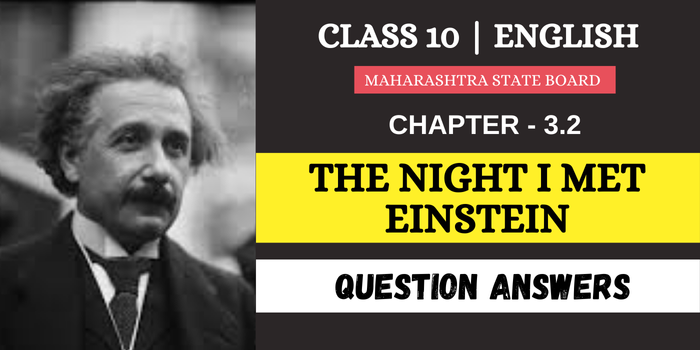
Maharashtra State Board Class 10 English The Night I Met Einstein Important Question Answers from Kumarbharti Book
The Night I Met Einstein – Question Answers: Looking for The Night I Met Einstein question answers for Maharashtra State Board class 10 English Kumarbharti Book? Look no further! Our comprehensive compilation of important questions will help you brush up on your subject knowledge. Practising Maharashtra State Class 10 English question answers can significantly improve your performance in the exam. Our solutions provide a clear idea of how to write the answers effectively. Improve your chances of scoring high marks by exploring The Night I Met Einstein question answers now. The questions listed below are based on the latest exam pattern, wherein we have given solved exercises and question answers of the textbook and extra questions (Multiple Choice Questions and Vocabulary Based Questions).
- The Night I Met Einstein Textbook Questions
- The Night I Met Einstein Extra Questions
- Vocabulary Based MCQs
- The Night I Met Einstein Summary, Explanation, Theme | Maharashtra Board Class 10
Maharashtra State Board Class 10 English Kumarbharti Lesson The Night I Met Einstein Textbook Questions
- With your bench-mate prepare a profile of Albert Einstein.
ALBERT EINSTEIN
- Profession :
- Field of Science :
- World famous theory proposed :
- Awards :
- Disability in childhood :
- Books written :
Answer-
ALBERT EINSTEIN
Profession: Scientist
Field of Science: Theoretical Physics
World famous theory proposed: Theory of Relativity
Awards: Nobel Prize in Physics (1921)
Copley j Medal by the Royal Society (1925),
Gold Medal of the Royal Astronomical Society (1926),
Max Planck medal of the German Physical Society (1929),
Prix Jules Janssen (1931)
Disability in childhood: There is some debate about whether Einstein had a learning disability in childhood. Some sources suggest he may have had dyslexia or a speech disorder. However, he excelled in Math and Science from a young age.
Books written:
- The World as I see it
- Relativity: The Special and the General Theory
- The Evolution of Physics
- The Meaning of Relativity
- Einstein’s Essays in Science
- Einstein on Peace
- Look at the pictures of musical instruments and write their names; what the player of the instrument is called and a famous player of the instrument.
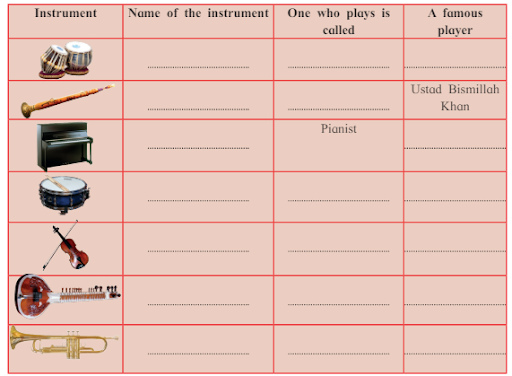
Answer-

- Separate the words in the columns they belong to. (chorus, ballet, melody, swar, kathak, raga, salsa, symphony, mudra, serenade, choreography, tune, audience, tango, allegro, duet, Odissi, choir, concert, performance, hip-hop )
| Music | Common to both arts | Dance |
Answer-
| Music | Common to both arts | Dance |
| chorus | choreography | ballet |
| melody | audience | kathak |
| swar | tune | mudra |
| raga | performance | tango |
| symphony | Odissi | |
| serenade | hip-hop | |
| allegro | ||
| duet | ||
| choir |
What was the entertainment arranged for by the hostess?
Ans. The entertainment arranged for by the hostess was a piano concert.
What was the writer’s reaction to classical music?
Ans. The writer didn’t understand classical music and thought he was tone-deaf. He felt bored and frustrated by it.
What do you learn from Einstein’s treatment to the young man?
Ans. We learn that Einstein was patient, encouraging, and passionate about sharing his knowledge. He helped the young man appreciate music on a deeper level.
Do you think the comparison between music and arithmetic was a good one? In what ways?
Ans. Yes, the comparison between music and arithmetic was a good one as it highlights the idea that learning music, like math, involves learning the basics first before moving to more complex concepts. Just as one wouldn’t expect someone to understand division without learning addition first, one can’t expect someone to appreciate complex music without listening to simpler forms first.
As far as listening is concerned, what difference do you notice between the writer and Einstein?
Ans. Einstein understood the musical elements of classical music, whereas the writer preferred songs that had words and the kind of music where he could follow the tune. Einstein enjoyed music, but the writer felt that he was tone-deaf and so could not understand music.
How did Einstein help the narrator appreciate music?
Ans. Einstein helped the narrator appreciate music by starting with simple songs with words he could understand. Then, he gradually progressed to more complex music without lyrics.
What does the last line tell you about Einstein?
Ans. The last line, “Opening up the frontiers of beauty,” tells us that Einstein sees appreciating music as a beautiful and enriching experience. He believes it is one of the greatest things humans can do – to explore and experience beauty in its various forms.
- Complete the following sentences.
(a) The narrator was not happy about the concert because ………………………
(b) When the narrator turned to look at his neighbour, he .………………………
(c) Einstein was surprised to hear that .………………………
(d) The narrator’s memory has an image of Einstein as .………………………
(e) The greatest act towards human beings is ………………………
Answer-
(a) The narrator was not happy about the concert because he could not understand classical music.
(b) When the narrator turned to look at his neighbour, he recognized a very famous face. He was Albert Einstein.
(c) Einstein was surprised to hear that the narrator had never heard of Bach.
(d) The narrator’s memory has an image of Einstein as a small man with a shock of untidy hair and a pipe in his mouth, with unusually warm eyes.
(e) The greatest act towards human beings, according to Einstein, is opening up the frontiers of beauty.
- Who said to whom?
| Statement | Who | To whom | Effect on the listener |
| “We are going to listen to a very good pianist.” | ……………………… | ……………………… | ……………………… |
| “I do not know anything
about Bach.” |
……………………… | ……………………… | ……………………… |
| “You are not tone-deaf.” | ……………………… | ……………………… | ……………………… |
| “Just allow yourself to listen that’s all there is to it” | ……………………… | ……………………… | ……………………… |
Answer-
| Statement | Who | To whom | Effect on the listener |
| “We are going to listen to a very good pianist.” | The Hostess | The Narrator | The listener was not very happy about the concert. |
| “I do not know anything
about Bach.” |
Albert Einstein | The Narrator | The listener wanted to say something ordinary to get out of the situation |
| “You are not tone-deaf.” | Albert Einstein | The Narrator | The listener tried to prove that he is tone-deaf.. |
| “Just allow yourself to listen that’s all there is to it” | Albert Einstein | The Narrator | The listener was able to appreciate the concert and clap sincerely. |
- List all the words from the story related to ‘Music’.
……………………………………………………………………………………………………………………………………………………………………………………………………………………………….
Answer-
Concert
Pianist
Classical music
Tone-deaf,
Piece
Bach
Gramophone
Song
Tune
Bing Crosby
John McCormack
- Rewrite the following sentences inserting the appropriate phrases in their proper form.
(to get out of, to come up, to turn on, to give in, to get into, to come down, to work out, to turn off, to give off, to give out, to work in)
(a) He ……………. bed and ……………. the living room, to see if the door was closed.
(b) To enjoy the music and relax, he ……………. the music and ……………. the lights.
(c) Smita ……………. to her desire and ……………. her favourite toys to the poor.
(d) You should ……………. Mathematics so that you can ……………. Problem.
Answer-
(a) He got out of bed and came down the living room, to see if the door was closed.
(b) To enjoy the music and relax, he turned on the music and turned off the lights.
(c) Smita gave in to her desire and gave off her favourite toys to the poor.
(d) You should get into Mathematics so that you can work out problem.
- (A) Give two points of difference between :
| Instrumental Music | Vocal Music |
| (1) | |
| (2) |
Answer-
| Instrumental Music | Vocal Music |
| (1) Instruments are used. | The voice (vocal cords) are used. |
| (2) Some part of the body is used as a medium to produce the sound, but the final sound is produced by the instrument. | Some parts of the body aid the production of sound (e.g., lungs, vocal tract, etc.), but the final sound emerges through the mouth. |
| (3) The output of the instrument is more or less of the same type, although the way the musician plays can give it an individualistic flavour. | Individual voices vary from the very low pitch to the very high. Hence the output varies and is very individualistic. |
| (4) An instrument does not sound like a voice. | The voice can be used to imitate the sound of an instrument. |
(B)
| Light Music | Classical Music | Folk Music |
Answer-
| Light Music | Classical Music | Folk Music |
| (1) Pleasant to hear | (1) Based on discipline. | (1) Comes from the heart |
| (2) Does not demand great attention or effort from the listener. | (2) Strict rules of rhythm and patterns. | (2) Voices popular emotions |
| (3) Could be from any genre. | (3) No strict rules |
- Prepare a word list of occupations in alphabetical order from the letters A upto T. (You may skip ‘K’ and ‘Q’)
Answer-
Architect
Banker
Chemist
Doctor
Engineer
Farmer
Graphic Designer
Historian
Interior Designer
Journalist
Lawyer
Musician
Nurse
Optician
Pilot
Receptionist
Scientist
Teacher
- Rewrite the following in indirect narration.
(a) ‘‘You are not tone-deaf’’, he said to me.
(b) ‘‘Could you have done it?’’, said Einstein.
(c) ‘‘Sing that back’’, he ordered me.
(d) He said, ‘‘What kind of music do you like?’’
(e) ‘‘I’m so sorry, Dr. Einstein’’, she said.
Answer-
(a) He assured me that I was not tone-deaf.
(b) Einstein asked if I could have done it.
(c) He instructed me to sing it back.
(d) He asked what kind of music I liked.
(e) She told Dr. Einstein that she was very sorry. Or She apologized to Dr. Einstein.
- (A) Degrees of Comparison (Positive / Comparative / Superlative)
Insert the appropriate expressions, choosing from those given after each sentences, for the positive degree.
(1) I am not ………… my friend.
(taller than/ more taller/just as tall as)
(2) They are ………… their neighbours.
(as helpful as/most helpful/more helpful)
(3) No other desert in Africa is ………… the Sahara Desert.
(biggest of all/nearly so big as/bigger as)
(4) Very few animals in the wild are ………… an elephant.
(exactly huger than/exactly as huge as/hugest than)
(5) Some snacks are ………… a pizza.
(at least as tasty as/tastier as/most tasty as)
Answer-
(1) I am not as tall as my friend.
(2) They are as helpful as their neighbours.
(3) No other desert in Africa is nearly so big as the Sahara Desert.
(4) Very few animals in the wild are exactly as huge as an elephant.
(5) Some snacks are at least as tasty as a pizza.
(B) Change the Degree of Comparision, as directed and rewrite without changing the meaning.
(1) No one in the class is as brilliant as Tanvi. (Superlative)
……………………………………………………………………………………..
(2) A diamond is one of the most precious of all stones. (Comparative)
……………………………………………………………………………………..
(3) Her handwriting is better than that of her sister. (Positive)
……………………………………………………………………………………..
(4) Jupiter is the largest of all planets. (Comparative)
……………………………………………………………………………………..
(5) He is not the greatest of all leaders. (Positive)
……………………………………………………………………………………..
(6) This painting is better than any other painting in the palace. (Superlative)
……………………………………………………………………………………..
Answer-
(1) Tanvi is the most brilliant girl in the class.
(2) Diamonds are more precious than many other stones.
(3) Her sister’s handwriting is not as good as hers.
(4) Jupiter is larger than any other planet.
(5) He is not as great as some of the other leaders.
(6) This painting is the best painting in the palace.
- Prepare a word chain.
Pianist →

Answer-
Pianist →

- Pick out words that refer to the following:
(1) A musical performance in public ………………….
(2) A lady who invites and looks after guests ………………….
(3) A device used to play recorded music ………………….
(4) One who is poor at deciphering musical notes ………………….
(5) Boundaries or limits of a field ………………….
Answer-
(1) A musical performance in public – Concert
(2) A lady who invites and looks after guests – Hostess
(3) A device used to play recorded music – Gramophone
(4) One who is poor at deciphering musical notes – Tone-deaf
(5) Boundaries or limits of a field – Frontiers
- ‘Music is the medicine of the mind’. Narrate an experience that leads to the
above conclusion. Write it in your own words, in your notebook.
Answer-
Today was the worst. Maths exam was a disaster, and I can’t seem to remember anything for History tomorrow. My head feels like it’s going to explode. Mom tried to cheer me up with warm jalebis, but even those tasted bland.
Frustrated, I grabbed my headphones and put up my favourite Bollywood playlist. Arijit Singh’s calming voice filled my ears, and the beats matched my racing heart. Slowly, the anger melted away. By the end of the song, I was humming along, a small smile on my face. Maybe music really is magic, just like Nani says. It chased away the bad feelings.
- You will come across many famous personalities in the story. Go to library or search
on internet the following names and write a few lines about the personalities given
below.
(a) Albert Einstein (c) Bing Crosby
(b) Johann S. Bach (d) John McCormack
Answer-
(a) Albert Einstein (1879-1955)
- German-born theoretical physicist widely acknowledged as one of the greatest and most influential physicists of all time.
- Developed the theory of relativity, one of the two pillars of modern physics (alongside quantum mechanics).
- Famous for his mass–energy equivalence formula E = mc².
- Won the 1921 Nobel Prize in Physics for his services to theoretical physics, and especially for his discovery of the law of the photoelectric effect.
(b) Johann Sebastian Bach (1685-1750)
- German composer and organist of the Baroque period.
- Considered one of the greatest composers of all time.
- Known for his complex and intricate compositions, often featuring counterpoint and fugue.
- Some of his most famous works include Brandenburg Concertos, Goldberg Variations, and the Mass in B minor.
(c) Bing Crosby (1903-1977)
- American singer and actor.
- One of the most popular singers of the 20th century, known for his smooth baritone voice and relaxed singing style.
- Pioneered the use of recording technology to popularize music.
- Starred in many successful films, including “Holiday Inn” and “Going My Way” (for which he won an Academy Award).
(d) John McCormack (1884-1945)
- Irish musician, known for his beautiful voice and passionate performances.
- Achieved international fame in the early 20th century, performing opera and popular songs.
- Renowned for his interpretations of Irish and Italian repertoire.
- Helped popularize Irish music around the world.
- Imagine you are the monitor of the class. You are asked to conduct an interview of a
famous scientist. Frame 8 to 10 interview questions with the help of the following points.
(1) Early life and education
(2) Interest for this particular field
(3) Any inspirational incident that occurred in his/her life
(4) Guru or mentor
(5) Inventions and awards
(6) Future plans
(7) Advice/Message to youngsters
Answer-
Interview with Dr. Albert Einstein
Hi everyone! Today, we have a very special guest – the world-renowned scientist, Dr. Albert Einstein! Thank you for joining us, sir.
(1) Early Life and Education: Dr. Einstein, can you tell us a little bit about your childhood and your early interest in science?
(2) Interest in this Particular Field: What sparked your curiosity in physics specifically? Was there a particular moment or event that drew you to this field?
(3) Inspirational Incident: Throughout your incredible career, did you face any challenges or setbacks? How did you overcome them, and did any specific person or experience inspire you to keep going?
(4) Guru or Mentor: Did you have any teachers or mentors who played a significant role in your scientific journey?
(5) Inventions and Awards: You’ve made groundbreaking contributions to science with your theory of relativity. Are there any other areas of scientific exploration that particularly excite you?
(6) Future Plans: What are you currently working on, Dr. Einstein?
(7) Advice/Message to Youngsters: Many students here dream of becoming scientists like you. What advice would you give to young people who are interested in pursuing science?
- Project :
Divide the class into four groups. Collect pictures or draw images of various musical instruments, of the following categories.
(a) Stringed Instruments (Guitar)
(b) Wind Instruments (Flute)
(c) Percussion Instruments (Tabla)
(d) Solid Metal Instruments (Cymbals)
Paste and decorate pictures on separate sheets of paper. Give proper headings and names. Compile into a file with a cover and suitable file-title.
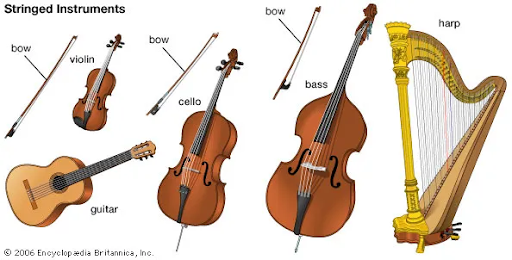
Wind Instruments
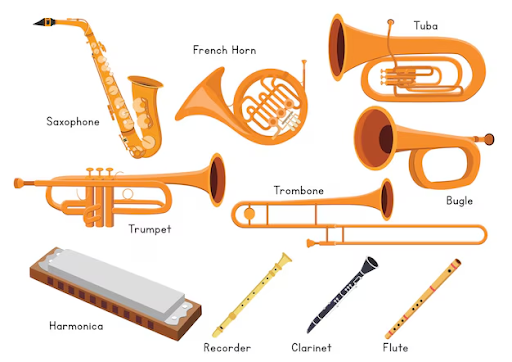
Percussion Instruments
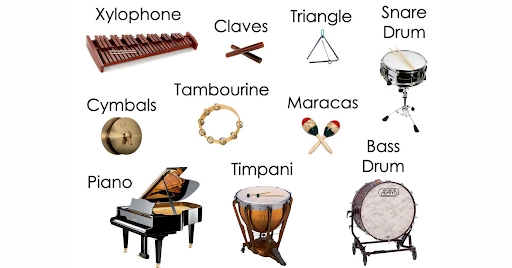
Maharashtra State Board Class 10 English Kumarbharti Chapter The Night I Met Einstein Extra Questions
Multiple Choice Questions
- Why was the narrator not happy about the concert?
a) He didn’t like the hostess.
b) He didn’t enjoy dinner.
c) He thought he was tone-deaf.
d) He didn’t know the pianist.
- What did the hostess arrange chairs for?
a) A lecture
b) A meeting
c) A concert
d) A game
- How did the neighbour appear to the narrator?
- a) Young and energetic
- b) Old man with white hair
- c) Short and bald
- d) Tall and well-dressed
- What surprised the old man about the narrator?
a) That he didn’t like the dinner.
b) That he didn’t know the hostess.
c) That he had never heard of Bach.
d) That he thought he was tone-deaf.
- What did Einstein compare learning music to?
a) Learning a new language
b) Learning to paint
c) Learning arithmetic
d) Learning to dance
- What did Einstein use to help the narrator appreciate music?
a) A textbook on music theory
b) A gramophone playing different types of music
c) A lecture on famous composers
d) A performance by a live orchestra
- What did Einstein consider the “greatest activity of which a human being is capable”?
a) Scientific discovery
b) Helping others
c) Opening up the frontiers of beauty
d) Attending a classical music concert
- Identify the theme of the lesson.
a) Learning is a Journey
b) Power of great teachers
c) There is no shame in not knowing
d) All of the above
- Which word best describes the old man’s attitude towards the narrator?
a) Dismissive
b) Patient and understanding
c) Critical and judgmental
d) Ignorant and uninformed
- Who is the author of the lesson “The Night I met Einstein”?
a) Jerome Weidman
b) Jeremy Robinson
c) John Milton
d) Joshua Cohen
Answer-
- c) He thought he was tone-deaf
- c) A concert
- b) Old man with white hair
- c) That he had never heard of Bach.
- c) Learning arithmetic
- b) A gramophone playing different types of music
- c) Opening up the frontiers of beauty
- d) All of the above
- b) Patient and understanding
- a) Jerome Weidman
Vocabulary Based MCQs
Choose the answer that is the SAME / SIMILAR to the underlined word (Questions 1 – 7).
- I was invited to dine at the house of a philanthropist.
a) politician
b) business owner
c) wealthy donor
d) famous artist
- I sat down so that I would not be impolite and waited for the concert to begin.
a) courteous
b) considerate
c) respectful
d) ill-mannered
- I thought I was tone-deaf.
a) Unable to sing well
b) Having a bad voice
c) Unable to distinguish or produce musical tones accurately
d) Disliking music in general
- Just then I heard a gentle, but firm voice saying, “You’re fond of Bach?”
a) liking a lot
b) angry
c) indifferent
d) confused
- Do you remember your first arithmetic lesson in school?
a) science
b) mathematics
c) history
d) language
- Opening up the frontiers of beauty.
a) Limitations
b) Boundaries
c) Conclusions
d) Interiors
- I was amazed that this great man was paying complete attention to me so that I could learn something new.
a) Confused
b) Astonished
c) Indifferent
d) Upset
Choose the answer that is the OPPOSITE of the underlined word (Question 8 – 10).
- Suddenly, he got up and turned off the gramophone.
a) Gradually
b) Loudly
c) Completely
d) Respectfully
- I am sitting beside a small man with a shock of untidy hair and a pipe in his mouth.
a) messy
b) bald
c) neat
d) dusty
- She looked puzzled.
a) Satisfied
b) Curious
c) Confused
d) Bewildered
Answer-
- c) wealthy donor
- d) ill-mannered
- c) Unable to distinguish or produce musical tones accurately
- a) liking a lot
- b) mathematics
- b) Boundaries
- b) Astonished
- a) Gradually
- c) neat
- a) Satisfied